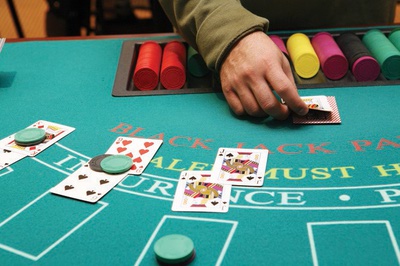
Harrah’s Entertainment introduced 6-5 blackjack payouts at Harrrah’s Las Vegas about five years ago, and the 6-5 games can be found at all of its properties in Southern Nevada.
Friday, June 18, 2010 | 2:01 a.m.
Reader poll
Sun Coverage
Sun archives
The payoff for blackjack has dropped at more Las Vegas tables, but the trade-off is that minimum bets for those games are a little lower.
In recent months, more than two dozen tables paying 6-5 for blackjacks have been added in Las Vegas, in some cases replacing games that paid the traditional 3-2. With the traditional payoff, a blackjack on a bet of $10 wins $15, but with 6-5 odds it wins only $12.
The spread of 6-5 games mirrors the rise of “party pits” — nightclub-themed gambling areas with games dealt by attractive women in revealing outfits. These pits, found near bars and nightclubs, typically feature 6-5 games and appeal to customers for whom gambling isn’t the main attraction.
“The dumbest mammal on the face of the Earth is a man in lust,” says Bill Zender, a table games consultant in Las Vegas.
Twenty-five percent of Strip blackjack games have 6-5 odds, according to Stanford Wong’s Current Blackjack News, a monthly newsletter that tallies the rules and payoffs of individual games in Southern Nevada.
Las Vegas gave birth nearly a decade ago to 6-5 blackjack, the brainchild of casino managers seeking to generate more profit from low-stakes games.
Blackjack aficionados have always decried 6-5, saying it is a ploy to dupe unsuspecting tourists who don’t know the difference.
“So many of the (blackjack) tables have been removed and turned into sucker games,” says Al Rogers, general manager of gambling news publisher Pi Yee Press, which distributes Blackjack News.
The spread of 6-5 games surprises Rogers, who thinks they will sour customers at a time casinos need the business most.
“They’re killing the cash cow instead of milking it,” he says.
The stakes are high for casinos. During the 12 months ended April 30, Strip gamblers wagered nearly $1 billion less on blackjack, and Strip blackjack revenue fell 16 percent, compared with the prior 12-month period, according to the Gaming Control Board. Meanwhile, blackjack is less profitable than it was two decades ago when games were cheaper to play. Strip casinos keep about 10 to 11 percent of blackjack wagers, compared with 13 to 14 percent in the late 1990s.
That’s because people aren’t gambling as much. Longer play time translates into higher casino profits. Although critics of 6-5 games say gamblers are spending their bankrolls more quickly and leaving the tables early, casino managers have a more straightforward explanation: Today’s gamblers, who are fewer in number and have less money to spend, are more distracted by a growing number of nongambling attractions such as nightclubs and pool parties that also cost money.
Zender, a former casino manager and Nevada gaming regulator, says he is advising casino clients to avoid 6-5 games because he thinks they will eventually drive away more business than they generate.
That’s a tough argument to win today, however, as 6-5 games may make as much money as 3-2 games despite getting one-third of the betting action, Zender says.
“This epitomizes some of the greed that’s gone on in the industry,” he says. “These are bad rules, but they can get away with it.”
Although many players don’t understand the difference in payoffs, more are catching on to the 6-5 games, which add 1 percent to the typical house edge of 1.5 percent against novice players, he says.
“Customers are getting less bang for their buck,” which will hurt Las Vegas in comparison with other markets that have not embraced 6-5 games, Zender predicts.
Joe Stormont, 50, drives from Bakersfield, Calif., to Las Vegas up to five times a year to play blackjack and take in other attractions. Yet finding a blackjack game to his liking on the Strip has grown difficult, he says.
“We find ourselves gambling less and less on each visit due to the increasingly tighter games,” Stormont says. “They are not in business to lose, but somehow they managed to do very well in years past with better odds on games and inexpensive food and rooms.”
Stormont says 6-5 blackjack is not the only mistake casinos are making. They have failed to lower minimum bet requirements despite the recession.
Although bets lower than $10 are hard to find on the Strip, minimums are lower than they were during the boom years, industry representatives say. That’s the reason gamblers are seeing more 6-5 blackjack — because with a higher edge, casinos can afford to lower the minimum bets, they say.
Major Las Vegas casinos have too much overhead to be able to afford 3-2 games at low limits of $1 or $5, says Max Rubin, a casino consultant and gambling book author. The low house edge on blackjack, close to break-even for skilled players and 1.5 percent for beginners, isn’t enough to pay the staff and maintenance costs resulting from that casino traffic, he says.
The traditional game — dealt from a single deck and with a 3-2 payoff for blackjacks — became unprofitable for casinos years ago because average players, by reading any number of books and strategy guides, had narrowed the house edge. Single-deck blackjack still exists in Las Vegas, but usually requires higher minimum bets or limits players’ options, such as doubling down.
To boost profit, casinos began replacing single decks with games using automatic shufflers and shoes holding six or more decks of shuffled cards at once. In “shoe games,” which are widespread, cards are dealt face up and gamblers can’t touch them. In most single-deck games, cards are dealt face down and players pick them up and hold them in one hand.
Smaller bettors missed playing single-deck blackjack “because they had been accustomed to handling the cards for decades,” says Gary Thompson, a spokesman for Harrah’s Entertainment.
Las Vegas casinos introduced 6-5 single-deck games in response to player demand for single decks, and they have spread ever since, he says.
Harrah’s introduced 6-5 games about five years ago at Harrah’s Las Vegas. They’re found in all of the company’s local casinos.
The proliferation of such games in the recession indicates players prefer them to higher-limit games with 3-2 payoffs, says Rubin.
Rubin once preached against 6-5 games but now thinks they make sense for some players, especially in the recession.
Gambling for lower stakes stretches playing time, he says. It’s the same concept behind penny slots that are more profitable for casinos in the long run yet enable players to lose money more slowly. Games with 6-5 payoffs can also be less intimidating for novice players who like to chat and drink with other players rather than sit next to serious bettors, who aren’t there to socialize.
The 6-5 games are “great” for tourists getting a feel for blackjack, Rubin says, but a bad move for locals casinos that depend on repeat business from gamblers who seek out the lowest house edge.
“One way to measure value is how much fun people are having,” he says. “Sometimes it’s OK to have sucker bets if the suckers are enjoying themselves.”
Ritch Skorka, strolling down the Strip with a friend this week, didn’t sound too pleased after a reporter informed him that the 6-5 blackjack games he likes have worse payoffs.
“I think people should know that, because that’s false advertising,” Skorka, 57, says. “I’d probably play the game with better odds.”
But the Roseville, Calif., resident changed his mind when presented with a hypothetical choice of wagering $20 on a 3-2 game or $5 on a 6-5 game.
“I’m a pretty conservative gambler,” Skorka says.


Join the Discussion:
Check this out for a full explanation of our conversion to the LiveFyre commenting system and instructions on how to sign up for an account.
Full comments policy